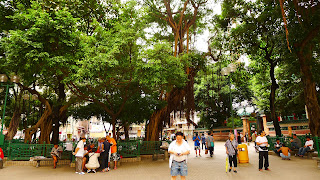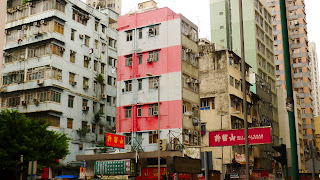Although unable to be at Victoria Park in Hong Kong this year, I was happy that a lot of young people I encountered during fieldwork attended the candlelight vigil to remember Tiananmen 1989. They stood in the crowded park despite the rain and the high temperatures. Across the other side of the Eurasian landmass (and a hop over the English Channel), there was also a small memorial service dedicated to Tiananmen victims, organized by a group of Hong Kong students in the U.K. Much like the crowds at Victoria Park, attendees here were varied; some had only heard of 4 June in passing whilst others had attended the vigils in Hong Kong every year; there were students from the PRC and from Hong Kong; some were children in 1989 and others were yet to be born.
Because Tiananmen had an impact on my life, and the lives of many others in my age cohort, I thought it would be nice to briefly share some related thoughts and feelings here. I detest writing about myself (though it is likely I unknowingly insert my ego in other posts) in fear of being accused of egocentricity. It is also because my life isn't rife with the drama that interests others, nor have I done anything significant and important thus far. But perhaps my experiences and memories of Tiananmen share commonalities with the experiences and memories of other people, and can be considered a part of a much bigger 'collective memory' that floats over our generation...maybe that is why it is worth writing, I don't know.
I've encountered comments that people my age are too young to remember; that our memories are either too vague to be worth talking about, or are only constructs from secondary sources. But I believe it isn't only about being able to witness the facts first-hand. Speaking to a friend who was an undergraduate student in Hong Kong during 1989, and who continues to be involved with 4th June events today, he remembers the crushing feeling of pessimism upon hearing about the Beijing crackdown. It was a pessimism made more intense because it was shortly preceded by widespread optimism; optimism that the Beijing students and residents can succeed in their aspirations, can win democratic and expressive freedoms, can challenge the upper echelons of government power, can prove that people can mobilize to change the parameters they face in life. A lot of these ideals vanished when the tanks and bullets arrived... The point is, for this friend, it doesn't matter whether people in our generation existed when Tiananmen took place, because there is an emotional component in remembering history that is capable of transcending generational barriers.
My memories of 1989 in Hong Kong are fragmented. My family was living in a small apartment in Quarry Bay at the time, and I saw the footage when we were sat around a folding table for dinner. Being a toddler lacking the intellectual capacity to comprehend the inferences from the happenings in Beijing, the television screen looked like a chaotic mass of colours. It was only by looking at my parents that I knew something was wrong, since they both stopped eating and became very quiet. Their quietness disappeared during the subsequent demonstration in Hong Kong, where both my parents tied ribbons around their foreheads (and the foreheads of my sister and I) and shouted slogans. I don't remember much of the demonstration, only that it was loud, crowded, hot, angry. Because of my short stature my dad sat me on his shoulders; but even at that height, my field of vision was only filled with faces and heads. As a child, that was an intimidating sight (my mum said I burst into tears); but thinking back as an adult, I find comfort knowing that so many people felt compelled to speak out.
Tiananmen was one of the reasons why my family emigrated from Hong Kong to Australia later in 1989, and why I became better versed in English than Cantonese. If we never emigrated, l would have grown up in Hong Kong, and have become someone different-- not better or worse, just different. Kind of strange to see the diverging points in your life, to know that so many possibilities were/are out there... The crackdown resulted with a steep learning curve about the key actors and activists involved in 1989, led to a general interest in local and international politics, and shaped my current research interests in school. It influenced my moral worldview; especially perceptions of right and wrong, good and bad, justice and injustice.
Personally, remembering 4th June is not only a historical exercise, but a moral one. We remember that people died in Beijing in 1989, and died unjustly at the hands of Communist Party officials; the PRC government has not acknowledged this, denied the relatives of Tiananmen victims their right to mourn, and reacted by imprisoning activists. We remember so that we can continue to demand for individual rights and freedoms, and if it does become realized one day, that we never take them for granted. Already we can see such freedoms being encroached upon in Hong Kong. The city is supposed to be last place on 'Chinese soil' where Tiananmen can be discussed, but unfortunately we can see media outlets toning down their Tiananmen coverage under self-censorship, with conservative political forces and the SAR government officials avoiding all mention of 1989. (I sometimes wonder what can compel these groups and individuals to deny Tiananmen; how differently do they see the world, and how did they turn out so different from those who do care?)
Thankfully, there are young people in Hong Kong who remain determined to ensure that the memory is passed to their successors. There are those who attend the candlelight vigils. Others experiment towards expressing their thoughts towards Tiananmen through novel outlets; there is Woofer Ten's來往廣場的單車 (Cycling to the Square) that took place in 2011 and 2013, and 這一代的六四 (This Generation's 4 June) that has been running for the past several years (see the post on this blog from last year). I find myself happy and proud to know that there are people who remember, and will continue to remember...
(Please excuse the poor quality of the illustration in this post: am still waiting for the laptop to be fixed.)




.jpeg)
.jpeg)
.jpeg)
.jpeg)
.jpeg)

.jpeg)
.jpeg)
.jpeg)

.jpeg)
.jpeg)



















